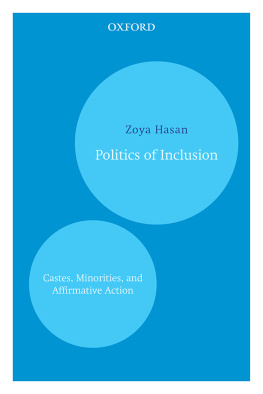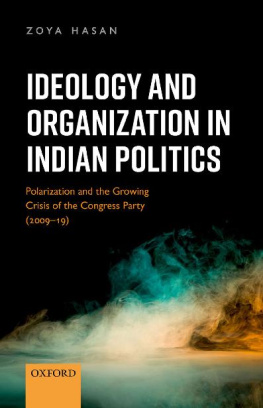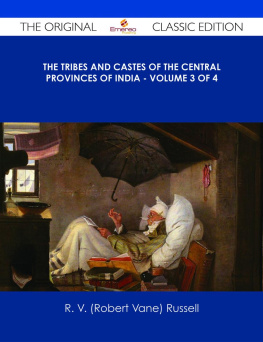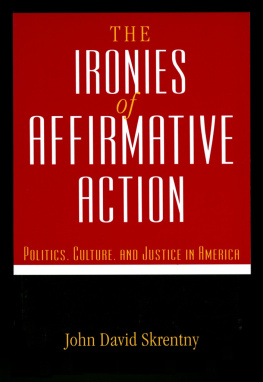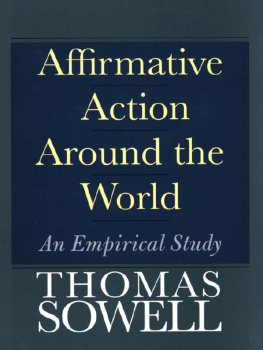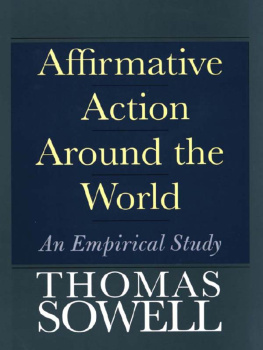Zoya Hasan - Politics of Inclusion: Castes, Minorities, and Affirmative Action (Oxford India Paperbacks)
Here you can read online Zoya Hasan - Politics of Inclusion: Castes, Minorities, and Affirmative Action (Oxford India Paperbacks) full text of the book (entire story) in english for free. Download pdf and epub, get meaning, cover and reviews about this ebook. year: 2011, publisher: OUP India, genre: Politics. Description of the work, (preface) as well as reviews are available. Best literature library LitArk.com created for fans of good reading and offers a wide selection of genres:
Romance novel
Science fiction
Adventure
Detective
Science
History
Home and family
Prose
Art
Politics
Computer
Non-fiction
Religion
Business
Children
Humor
Choose a favorite category and find really read worthwhile books. Enjoy immersion in the world of imagination, feel the emotions of the characters or learn something new for yourself, make an fascinating discovery.
- Book:Politics of Inclusion: Castes, Minorities, and Affirmative Action (Oxford India Paperbacks)
- Author:
- Publisher:OUP India
- Genre:
- Year:2011
- Rating:3 / 5
- Favourites:Add to favourites
- Your mark:
- 60
- 1
- 2
- 3
- 4
- 5
Politics of Inclusion: Castes, Minorities, and Affirmative Action (Oxford India Paperbacks): summary, description and annotation
We offer to read an annotation, description, summary or preface (depends on what the author of the book "Politics of Inclusion: Castes, Minorities, and Affirmative Action (Oxford India Paperbacks)" wrote himself). If you haven't found the necessary information about the book — write in the comments, we will try to find it.
Zoya Hasan: author's other books
Who wrote Politics of Inclusion: Castes, Minorities, and Affirmative Action (Oxford India Paperbacks)? Find out the surname, the name of the author of the book and a list of all author's works by series.
Politics of Inclusion: Castes, Minorities, and Affirmative Action (Oxford India Paperbacks) — read online for free the complete book (whole text) full work
Below is the text of the book, divided by pages. System saving the place of the last page read, allows you to conveniently read the book "Politics of Inclusion: Castes, Minorities, and Affirmative Action (Oxford India Paperbacks)" online for free, without having to search again every time where you left off. Put a bookmark, and you can go to the page where you finished reading at any time.
Font size:
Interval:
Bookmark:
With impressive analytical clarity and historical depth, this wonderful book illuminates the complex political debates about affirmative action in India. Hasan shows how a necessary and laudable focus on caste has ledto a neglect of other inequalities and, hence, to a very unbalanced and underinclusive set of policies.
Martha C. Nussbaum
University of Chicago
This book deals with one of the most topical issues of Indian politics and societyassess[es] the impact of positive discrimination on the caste system, [and] include[s] religious minorities in the analysisIt is bound to become a reference study.
Christophe Jaffrelot
CNRS, France, and Centre dtudes et de Recherches
Internationales (CERI-Sciences Po), Paris
[This book] provides acritique of thecontemporary failures of the Indian state to address the political under-representation and socioeconomic disadvantages ofminorities. Hasan combines a powerful critique of existing public policies with a clear vision of how the state could address multiple axes of disadvantage.
Amrita Basu
Amherst College
In the midst of what has been called the second democratic revolution and the vast literature it has inspired, Hasan has broken new ground[s] in this comparative studyThis is a distinctive and commendable work of major importance.
Achin Vanaik
University of Delhi
Zoya Hasan


Oxford University Press is a department of the University of Oxford.
It furthers the Universitys objective of excellence in research, scholarship,
and education by publishing worldwide. Oxford is a registered trademark
of Oxford University Press in the UK and in certain other countries
Published in India by
Oxford University Press
YMCA Library Building, 1 Jai Singh Road, New Delhi 110 001, India
Oxford University Press 2009
The moral rights of the author have been asserted
First Edition published in 2009
Oxford India Paperbacks 2011
All rights reserved. No part of this publication may be reproduced, stored
in a retrieval system, or transmitted, in any form or by any means, without
the prior permission in writing of Oxford University Press, or as expressly
permitted by law, by licence, or under terms agreed with the appropriate
reprographics rights organization. Enquiries concerning reproduction
outside the scope of the above should be sent to the Rights Department,
Oxford University Press, at the address above
You must not circulate this work in any other form
and you must impose this same condition on any acquirer
ePub ISBN-13: 978-0-19-908866-9
ePub ISBN-10: 0-19-908866-7
Typeset in AGaramond Pro 11/13.4 by Jojy Philip
Printed by De Unique, New Delhi 110 018
For Mushir
This book has grown out of my engagement with issues of social inequality, disadvantage, and deprivation over the past few years. I have tried to understand how the Indian states differential approach and policies towards caste-based disadvantage relative to the deprivation of religious minorities affect the welfare, wellbeing, and representation of these groups. Evidently, deprivation and discrimination in India are widespread and not confined to a single community or group. Yet, official discourse continues to revolve essentially around the issue of caste-based discrimination, leaving unaddressed many other critical areas. While there is no doubt that caste remains the prime source of discrimination, there is a reticence in taking on board the deprivation and disadvantage of religious minorities, even when they suffer from marginalization, as in the case of Muslims who have not adequately benefited from the countrys social and economic progress. Nonetheless, policies remain anchored in identifying disadvantage in relation to membership of a particular group. Hence, the large number of programmes and policies targeted at particular groups seen as historically disadvantaged. But it appears we have now reached a stage where we cannot avoid the issues and problems arising out of disadvantage and discrimination in the present day. One way of doing this is to look at the politics of inclusion from a comparative perspective, which can provide insights into the paradoxes of inclusion and exclusion in contemporary India.
This work differs from existing literature on the subject of inclusion in that it compares approaches and experiences with regard to equalizing opportunities and conditions for various disadvantaged groups and is not confined to caste groups alone. The idea of comparison took shape in the context of the Central governments decision to implement 27 per cent reservations for the Other Backward Classes in higher education at the same time as there has been no serious effort to reverse the marginalization of Muslims through affirmative action. The purpose of the comparative assessment is not to critique policies towards the historically disadvantaged groups that have long been discriminated against, but to underline the need for a wider perspective on affirmative action in order to deal with the challenges of the present. There is a need to redress other social inequalities by revisiting and supplementing existing policies of affirmative action and evolve a forward-looking, egalitarian, and just approach of dealing with disadvantage in a democratic society.
A major part of the book was organized and written while I was a visiting professor at the University of Zurich in the winter semester of 20067 and during visiting fellowships at the Foundation Maisondes Sciences del Homme, Paris. Many of the ideas and arguments expressed in these chapters have been presented at many universities and conferences over the past five years. The discussion with and comments of participants in these conferences have helped to refine the arguments in this book.
During the past few years, as a member of the National Commission for Minorities (NCM) and while chairing the Planning Commissions Working Group on Empowering the Minorities for the Eleventh Five Year Plan, I was able to gain invaluable insights regarding the fundamental and enduring differences in the states approach towards disadvantaged groups of lower castes and religious minorities. The comparative perspective represented in this book would have been inconceivable without my association with these institutions, especially the NCM. The views articulated in this work, however, do not reflect the position or point of view of any of these institutions, which are in no way responsible for the ideas expressed here.
I am particularly grateful to Amrita Basu, Martha Nussbaum, Suhas Palshikar, and Eswaran Sridharan for reading earlier drafts of this manuscript and making excellent comments and suggestions. There are many colleagues and friends who have helped in various ways, and who have, at one point or another, provided useful advice and ideas. These include Hamid Ansari, Balveer Arora, Sudeep Banerjee, Praful Bidwai, Rajeev Bhargava, Anuradha Chenoy, Satish Deshpande, Francine Frankel, Jayati Ghosh, Christophe Jaffrelot, Ritu Menon, Geetha Nambissan, Saeed Naqvi, Malini Parthasarathy, Prabhat Patnaik, Pamela Philipose, Rajan Prasad, Imrana Qadeer, Abhijit Sen, and Achin Vanaik. I would also like to thank my colleagues at the Centre for Political Studies, Jawaharlal Nehru University, for providing a supportive atmosphere in which this work could be pursued. I wish to acknowledge the help of several of my students who provided research support at various stages of this work, especially Manzur Ali, Adnan Faruqui, Maidul Islam, Poulomi Pal, and Vasundhara Sirnate. I am grateful to the staff of the NCM, the Parliament Library, and the Nehru Memorial Museum and Library for their help. I owe special thanks to Mohammed Saleem and Poonam Singh for their computer support and help in preparing the tables for the book.
Font size:
Interval:
Bookmark:
Similar books «Politics of Inclusion: Castes, Minorities, and Affirmative Action (Oxford India Paperbacks)»
Look at similar books to Politics of Inclusion: Castes, Minorities, and Affirmative Action (Oxford India Paperbacks). We have selected literature similar in name and meaning in the hope of providing readers with more options to find new, interesting, not yet read works.
Discussion, reviews of the book Politics of Inclusion: Castes, Minorities, and Affirmative Action (Oxford India Paperbacks) and just readers' own opinions. Leave your comments, write what you think about the work, its meaning or the main characters. Specify what exactly you liked and what you didn't like, and why you think so.

